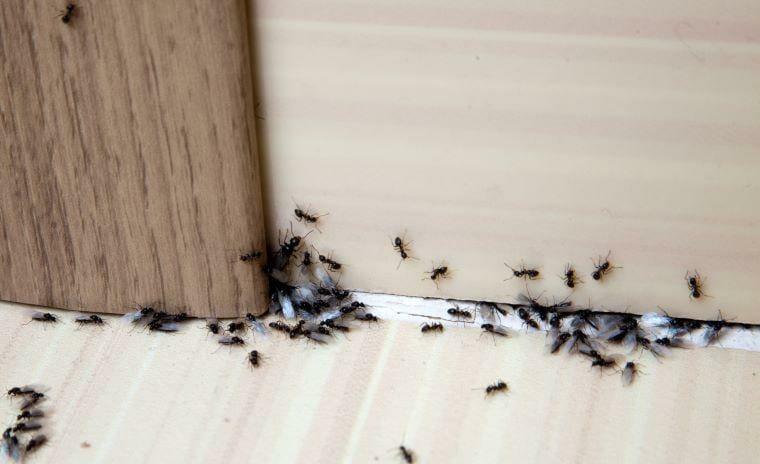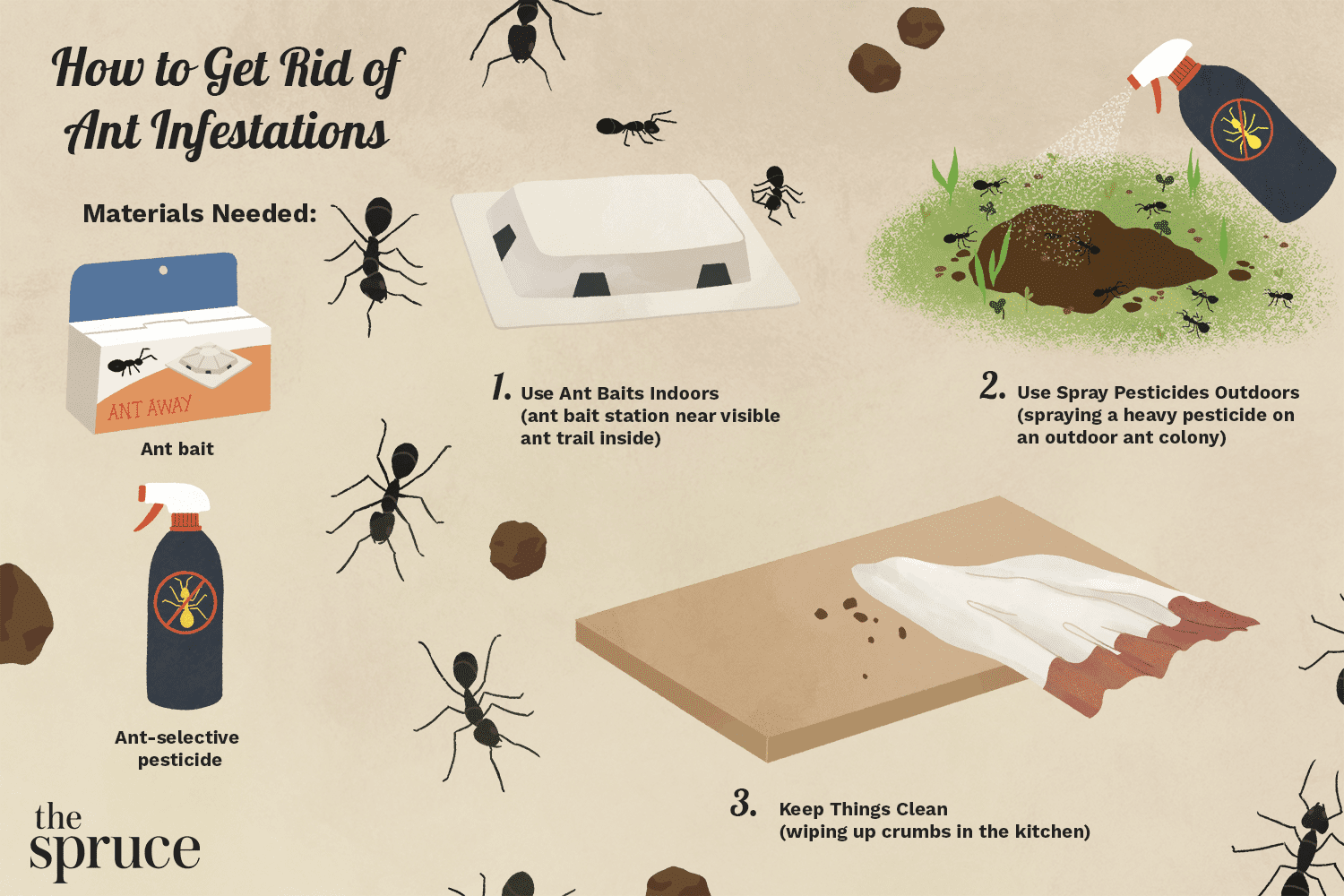To effectively eliminate an ant colony in the house, use bait stations or insecticidal dust. Ensure to locate and treat the nest directly for the best results.
Contending with an ant infestation at home can be a distressing ordeal. These tiny invaders can undermine food safety and cause frustration with their relentless numbers. To combat these pests, homeowners need reliable methods that strike at the heart of the colony.
By deploying bait stations, ants carry toxic substances back to their nest, inadvertently poisoning the entire colony, including the queen. For immediate results, insecticidal dust works wonders by penetrating the nest and eliminating ants on contact. Safe handling of these substances is paramount; always follow the instructions carefully for effective and responsible pest control. Remember, patience is key—as ant colonies can take several days to a week to be completely eradicated once treatment begins.
Credit: www.businessinsider.com
Common Ant Species Invading Homes
Dealing with uninvited guests like ants in the home can be a hassle. Various ant species show up, each bringing different challenges. Understanding which type you’re facing is the key to sending them packing.
Identifying Ant Types
See a line of ants on the counter? They may be one of these common house invaders. Check their size and color. It tells us which species they are.
| Ant Type | Color | Size (approx.) |
|---|---|---|
| Carpenter Ants | Black | 0.5 inches |
| Sugar Ants | Dark Brown | Small |
| Fire Ants | Reddish-brown | Small |
Habits And Habitats
Carpenter ants love wet wood. Look around leaks.
Sugar ants are after sweets. Check the pantry!
Fire ants are outdoor lovers but might come in for food and shelter.
Find their trails and you can trace where they’re living. Each species has unique habits that you can exploit to get rid of them.
Consequences Of Ignoring Ant Infestations
An ant colony in your house is not just a small nuisance. It can lead to serious problems if ignored. From health risks to property damage, the impact can be significant. It is vital to act swiftly to minimize these consequences.
Health Risks
Ants in your home can pose several health risks. They can contaminate food and surfaces. This contamination may lead to food poisoning or allergies. Attention to eradication is essential to protect your family’s health.
- Contaminated food – Increased risk of foodborne illnesses
- Allergies and bites – Some ants bite and can cause allergic reactions
- Pathogen spread – Ants can carry bacteria, spreading diseases throughout your home
Property Damage
Ants can cause unchecked damage to your property. Some species can even weaken your home’s structure. Early extermination prevents costly repairs down the line. Keeping your home safe and intact requires prompt action against ants.
| Type of Ant | Damage Caused |
|---|---|
| Carpenter Ants | They tunnel through wood, damaging structures |
| Pavement Ants | Nest in cracks, causing structural vulnerabilities |
Preventative Measures To Deter Ants
Preventative Measures to Deter Ants play a key role in maintaining an ant-free home. These proactive strategies can significantly reduce the chances of an ant infestation. Implement the following steps to keep your home ant-proof.
Seal Entry Points
Ants enter homes through tiny gaps and cracks. Inspect your home’s exterior for potential ant entrances. Use caulk to seal openings around windows, doors, and foundations. Check for gaps where pipes and wires enter your household. Keep ants out by securing these points.
Regular Cleaning Regimen
Cleanliness is crucial to prevent ants. Wipe down surfaces to remove food residues. Sweep floors daily to eliminate crumbs. Ensure to vacuum regularly, focusing on hard-to-reach places. Clean spills immediately, especially sticky and sweet substances. Emphasize kitchen cleanliness.
Natural Deterrents
- Vinegar Solution: Mix equal parts water and vinegar. Spray around potential entry points to repel ants.
- Citrus Peels: Place lemon or orange peels at entry points. The citrus scent deters ants.
- Cinnamon: Sprinkle cinnamon or place cinnamon sticks in areas where ants frequent.
- Peppermint Oil: Dab cotton balls with peppermint oil. Place them where ant activity is observed.
Incorporate these tips into your routine to create a barrier against ants. Maintain these preventative measures for long-term results.
Direct Attack: Diy Ant Colony Eradication
Dealing with ants can be frustrating. Sometimes, calling the professionals isn’t an option and you need a do-it-yourself method. Kick the ant invaders out with these proven DIY techniques. Ready for battle? It’s time for a direct attack on the colony!
Boiling Water Method
One of the quickest ways to stop ants in their tracks is the boiling water technique. Here’s how:
- Locate the ant hill
- Boil water in a kettle
- Pour the boiling water directly onto the ant hill
Be cautious, as boiling water can also kill plants and beneficial insects.
Boric Acid And Sugar Solution
A mixture of boric acid and sugar offers a sweet yet lethal treat for ants. Follow these steps:
- Mix 1 part boric acid with 3 parts sugar
- Add enough water to get a syrupy consistency
- Place the mix near ant trails or at entry points
The ants carry the bait back to the colony, poisoning others.
Diatomaceous Earth
Diatomaceous earth acts like tiny razor blades to ants. It’s safe for humans and pets, but deadly to ants. Use as follows:
- Spread a thin layer where ants are seen
- Ensure the area is dry as wetness reduces effectiveness
Ants walking over diatomaceous earth will not survive. The colony weakens and eventually dies out.
Commercial Ant Baiting Systems
Bold and direct action is essential when tackling a hidden enemy like an ant colony within a house. Commercial ant baiting systems stand out as a powerful tactic. These are designed not just to kill the ants you see but to target the entire colony. Let’s explore the inner workings of these baiting systems and discover the key to making an anthill crumble from the inside out.
How Bait Stations Work
Ant bait stations are ingenious in simplicity. These small enclosures contain attractive bait laced with slow-acting poison. Worker ants march in, take the bait, and then journey back to share with the colony. Over time, the toxin spreads throughout, reaching the queen and young. Without them, the colony inevitably falls.
Choosing Effective Baits
Selecting the right bait ensures a swift victory over unwanted ants. Effective baits appeal to ant preferences and contain the proper poison. Some baits may cater to protein-loving ants, while others may target those with a sweet tooth. The table below provides a quick guide to choosing your arsenal against the ant invasion.
| Ant Preference | Type of Bait |
|---|---|
| Protein-based | Baits with slow-acting insecticides |
| Sweet-based | Gel baits with sugary substances |
| Oil/Fat-based | Granular baits for grease-feeders |
- Pick baits according to ant diet.
- Look for active ingredients like borax or fipronil.
- Change baits periodically to prevent bait aversion.
Expert Extermination Services
Expert Extermination Services provide the ultimate relief against ant invasions. Professional exterminators bring robust solutions to your doorstep, ensuring a thorough and swift removal of ant colonies.
When To Call Professionals
Spotting a few ants wandering around may not sound the alarm. However, an enduring ant problem or larger colony signifies it’s time for expert help. Remember, ants often indicate more hidden issues. It’s best to seek professional services in the following situations:
- Repeat infestations even after DIY treatments
- Large colonies visible inside your home
- Property damage, like hollowed-out wood
- Sensitive environments, requiring safe methods
What To Expect During Extermination
On securing expert service, a proven process starts. This table provides an insight into what to expect:
| Step | Action |
|---|---|
| 1. Inspection | Experts assess your space, identifying the ant species and colony size. |
| 2. Treatment Plan | Custom strategies tailored to your specific ant issue and home environment. |
| 3. Extermination | Professionals execute the plan using safe, effective methods and products. |
| 4. Follow-up | Additional visits ensure the colony is gone and helps prevent future invasions. |
Ant-free living is within reach with expert extermination services. Peace of mind comes standard, knowing your home is in the hands of seasoned professionals.
Maintaining An Ant-free Home
Living in an ant-free home requires more than a one-time fix. It’s a continuous effort that involves everyone in the household. By conducting regular inspections and educating all family members on prevention tips, it becomes easier to keep these tiny invaders at bay. Let’s explore how to create an effective defense against ants.
Regular Inspections
Check your house often for signs of ants. These inspections should include:
- Kitchen: Search for crumbs or sticky spots.
- Bathrooms: Look for standing water.
- Bedrooms: Inspect for food particles.
- Basements and attics: Watch out for nests or trails.
Outdoor areas, such as patios or gardens, are also key spots for ants to gather. Regular checks will help you spot an invasion early.
Educating Household Members
Tell everyone in your home how to avoid attracting ants. This education can include simple habits such as:
| Action | Effect |
|---|---|
| Storing food properly | Keeps smells that attract ants away. |
| Cleaning spills immediately | Prevents ant trails. |
| Taking out the trash often | Limits ant food sources. |
| Sealing entry points | Blocks ant access to your home. |
Educate kids, too, so they understand not to leave food out. Everyone’s actions make a difference in keeping the home ant-free.

Credit: smithspestmanagement.com
:max_bytes(150000):strip_icc()/TheSpruce_Howtogetridofandpreventodoroushouseants_colorv1-d55f1b3ffb8f44e1a34ba6d0a07bd4a0.png)
Credit: www.thespruce.com
Frequently Asked Questions On Best Way To Kill Ant Colony In House
What Is The Fastest Way To Kill An Ant Colony?
The fastest way to kill an ant colony is by using bait traps with poisoned bait, which ants carry back to the colony, effectively eliminating it.
How Do I Get Rid Of An Ant Infestation In My House?
Identify and eliminate food sources; use natural deterrents like vinegar. Seal entry points to prevent more ants. Set ant baits with boric acid for colony elimination. Contact a pest control professional for severe infestations.
How Long Does It Take To Kill An Entire Ant Colony?
Eliminating an entire ant colony can take anywhere from several days to a few weeks, depending on the treatment method.
What Ant Killer Kills The Whole Colony?
Bait stations with slow-acting insecticides, like borax-based Terro, can eliminate entire ant colonies. Gel baits and granular baits also offer colony-wide control when ants carry the poison back to their nest.
Conclusion
Eliminating an ant infestation effectively requires a strategic approach. Choose the method that best suits your needs and safety considerations. Remember, persistence is key to a long-term ant-free home. Keep areas clean and revisit your strategy if needed. Say goodbye to unwanted guests and enjoy your peaceful, ant-free living space.

I’m MD Tanvir, and I bring years of expertise gained from working closely with pest control companies to the forefront. My journey in the industry has inspired me to launch Bug Battler, a platform aimed at equipping people with the know-how to combat pests autonomously. Through Bug Battler, I aim to empower individuals with practical insights to tackle pest infestations effectively.

